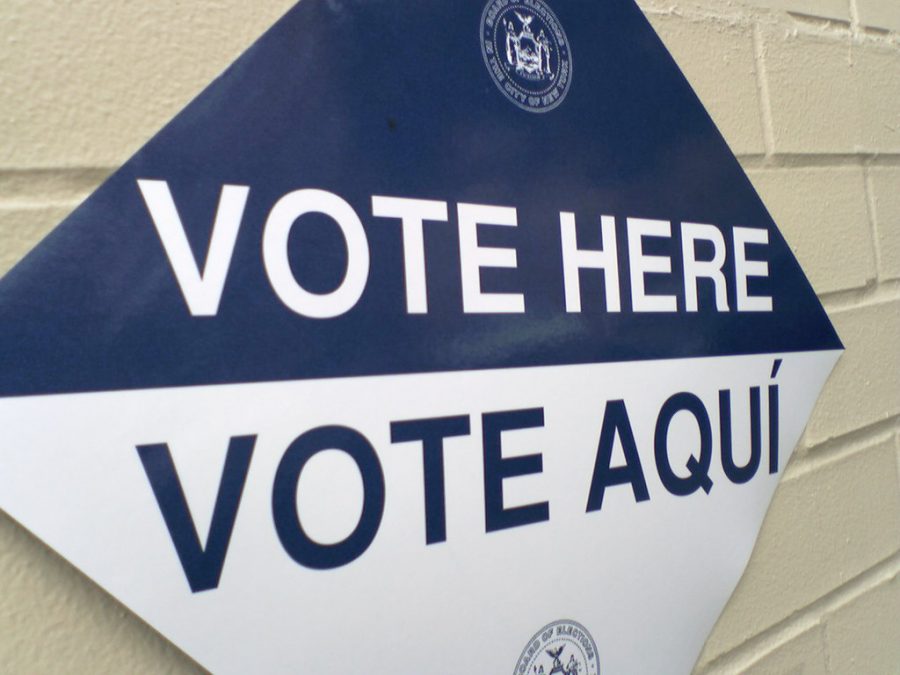Election 2020: California Proposition Rundown
October 20, 2020
With the 2020 general election two weeks away on Nov. 3, voters will be asked to choose between presidential candidates and important local propositions. Here is The Inquirer’s rundown of the 12 California propositions, their importance, and why the two major parties are either endorsing or opposing them, according to the Official Voter Information Guide, cadem.org, and cagop.org.
State Proposition 14: Authorizes bonds continuing stem cell research.
Proposition 14 authorizes $5.5 billion in state bonds to fund grants from the California Institutes of Regenerative Medicine. Programs that are promoting stem cell and other medical research, including student and physician training, stem cell therapy development, and delivery, would benefit. Prop 14 dedicates $1.5 billion to research for Alzheimer’s, Parkinson’s, stroke, epilepsy and other brain and central nervous system diseases. The proposition would cost the state of California an estimated $7.8 billion.
The Democratic Party is backing this proposition. It would continue stem cell research funding to develop treatments and cures for chronic and life-threatening diseases. The Republican Party opposes this proposition citing it would make taxpayers responsible for an additional $5.5 billion to fund stem cell research.
State Proposition 15: Increase funding sources for public schools, community colleges, and local government services by changing tax assessment of the commercial and industrial property.
Proposition 15 would increase funding for K-12, community colleges and local government sources by $6.5 billion to $11.5 billion per year by changing the tax assessment of commercial and industrial properties worth more than $3 million. This measure proposes that commercial land and buildings be taxed based on the current market value rather than the original purchase price. The proposition would begin in 2022 and would not affect specific businesses before 2025.
The Democratic Party endorses this proposition because it reclaims $12 billion for local schools and communities. The Republican Party opposes Prop. 15 saying it would cause a total annual property tax increase of $11.5 billion – the largest in state history. Republicans claim the measure would increase the cost of living, resulting in higher rents for small businesses already impacted by the COVID-19 pandemic and recession.
State Proposition 16: Allies diversity as a factor in public employment, education, and contracting decisions.
Proposition 16 would allow state and local governments to consider demographic features, including race, gender and education, in their decision-making policies by repealing article I, section 31, of the California Constitution. This article was added by Proposition 209 in 1996 and? states that California shall not discriminate against, or grant preferential treatment to, any individual or group based on race, sex, color, ethnicity, or national origin in the operation of public employment, public education, or public contracting.
The California Democratic party backs this proposition, saying it will end the ban on affirmative action, leveling the playing field for women and communities of color. The California Republican Party opposes rop. 16 because it claims it repeals a constitutional protection that ensures every Californian is treated equally, instead of enacting government quotas for employment, contracting, and education.
State Proposition 17: Restores right to vote after completion of prison term.
Proposition 17 would amend the state constitution to restore voting rights to those who had their privilege revoked while serving a prison term. Prop. 17 would reinstate the right to vote to an estimated 50,000 people on state parole. Financially this would mean a one-time state cost of hundreds of thousands of dollars to update voter registration cards and systems.
The California Democratic Party backs this proposition because it would restore voting rights to Californians who have completed their prison term. The California Republican Party opposes Prop. 17 because it claims it would allow convicted felons of murder, rape, sexual abuse against children, kidnapping, assault and human trafficking the right to vote before completing their sentence, including parole.
State Proposition 18: Amends California Constitution to permit 17-year-olds to vote in primary and special elections if they turn 18 by the next general election and otherwise eligible to vote.
Proposition 18, if passed, would permit 17-year-olds, who would turn 18 within the year, the right to participate in any primary or special election that occurs before the next general election. Prop. 18 would cost counties between $100,000 and $1 million every two years to send and process voting materials.
This proposition is backed by the California Democratic Party, as it would allow those who turn age 18 by a November general election to vote in that year’s primary elections. The California Republican Party does not endorse Prop. 18 because it would allow high school seniors to vote for necessary tax measures that only adults would pay.
State Proposition 19: Changes certain property tax rules.
Proposition 19 permits homeowners 55 and over with severe disabilities or whose homes were destroyed by disasters to transfer their primary property tax base value to their replacement residency of any amount located in the state of California. This proposition would also narrow the special rules for inherited properties not used as a house or farm, leading to higher property taxes for some inherited properties, which would benefit local governments and schools and save eligible homeowners money when moving from one house to another.
The California Democratic Party approves this proposition because it helps seniors, disabled homeowners, wildfire victims and closes tax loopholes on out-of-state trust fund heirs. The California Republican Party has not taken a position on Prop. 19.
State Proposition 20: Restricts parole for certain offenses currently considered to be non-violent. Authorizes felony sentences for certain offenses currently treated only as misdemeanors.
Proposition 20 would limit access to the parole program established for non-violent offenders who have completed their full term by changing the standards and requirements of parole. Standards and requirements include charges equal or less to a misdemeanor and collection of DNA samples submitted to the state database. This proposition would also increase criminal penalties for some theft-related crimes, change the supervision of released prisoners in the community, revise Proposition 57 on the considerations of releasing inmates from prison.
The California Democratic Party disapproves of Prop. 20 because it claims it wastes tens of millions of dollars on prisons, causing cuts to rehabilitation and schools. The California Republican Party backs this proposition because it strengthens criminal penalties, ensuring that the most severe offenders are brought to justice by reversing recent statewide policies that allow criminals to get off easy.
State Proposition 21: Expands local governments’ authority to enact rent control on residential property.
Proposition 21 would allow local governments to limit and establish rent control on residential properties over 15 years old. Ultimately this proposition would amend the current statewide local limits to increase to 15 percent over three years at the start of a new tenancy. Fiscally the value of rental houses would decline, renters would spend less and landlords would receive less income.
This proposition is being endorsed by the California Democratic Party because it keeps families in their homes, prevents homelessness and preserves affordable housing. The California Republican Party opposes Prop. 21 because it feels it gives unelected bureaucrats power to add fees on apartments and even some single-family homes without a vote of the people, and would make the housing crisis worse.
State Proposition 22: Exempts app-based transportation and delivery companies from providing employee benefits to certain drivers.
Proposition 22 would classify rideshare and delivery companies as “independent contractors” rather than “employees” unless companies set hours, require a specific ride or delivery request, or restrict the employee from working for other companies. Independent contractors will not be protected by employment laws such as minimum wage, overtime, unemployment insurance, or worker’s compensation. They are entitled to minimum earnings, healthcare subsidies and vehicle insurance. Prop. 22 would also criminalize the impersonation of drivers. This prop would increase state income taxes by rideshare and delivery drivers and investors.
The California Democratic Party opposes this prop because it will exempt Uber and Lyft from providing drivers the benefits they deserve. Drivers’ rights over Uber/Lyft profits. The California Republican Party backs Prop. 22 because it claims it would protect the freedom and flexibility of drivers to work when they want, providing them with a stable income and giving the broader economy a boost.
State Proposition 23: Establishes state requirements for kidney dialysis clinics. Requires on-site medical professional.
Proposition 23 requires at least one licensed physician on-site during the treatment of outpatient kidney dialysis clinics unless there is a shortage of qualified licensed physicians, and the clinic has at least one nurse practitioner or physician assistant onsite. This proposition would also require clinics to report dialysis-related infection data to state and federal government, prohibit the closing or reducing service without state approval, and exempt the refusal of treatment to patients based on the source of payment for care. Financially this would increase state and local government costs in the tens of millions of dollars annually.
The California Democratic Party endorses this proposition because it would improve safety and prohibits discrimination in dialysis clinics to protect gravely ill patients. The California Republican Party opposes rop. 23 because it states it would force unnecessary regulations and costs on dialysis clinics, shutting nearly half of them down and putting countless patients’ lives at risk.
State Proposition 24: Amends consumer privacy laws
Proposition 24 allows consumers to prevent businesses from sharing personal information, correct inaccurate information, and limit the use of “sensitive personal information” like geolocation, race, ethnicity, religion, genetic data, private communication, sexual orientation, and specific health care information. This proposition establishes the California Privacy Protection Agency to enforce and implement consumer privacy laws and impose fines. Proposition 24 would also prohibit companies from holding personal information for longer than reasonably necessary. This proposition increases state costs to at least $10 million annually for the new state agency, and into the low millions annually for increased court and Department of Justice enforcement workload. The impact of state and local tax revenues are unknown.
Neither party backs this proposition. The California Democrats are neutral on this law, and the California Republicans do not endorse Prop. 24 because it says it would create a new, unaccountable state bureaucracy with vast power over Californians’ personal information. The Republican Party believes this proposition would cost Californians more money in exchange for less privacy.
State Proposition 25: Referendum on the law that replaced money bail with a system based on public safety and flight risk.
Proposition 25 would replace the money bail system with a system based on determining public safety and flight risk. This proposition would also limit the detention of a person facing a misdemeanor in jail before facing trial. Fiscally, the new pretrial release process would increase workload for state trial courts, as well as county district attorneys and public defenders
The California Democratic Party endorses Prop. 25 because it says it would replace discriminatory and unjust money bail with a fairer system based on public safety – not people’s ability to pay. The California Republican Party opposes this proposition because it claims it would eliminate Californians’ constitutional right to choose bail or pretrial release programs when accused of a crime, forcing people to rely on government-managed computer algorithms to decide who gets released.
Don’t forget to get out and vote, Election day is Nov. 3. Check out Contra Costa County Elections to find the closest polling place near you.







































































